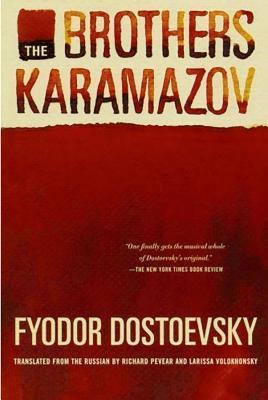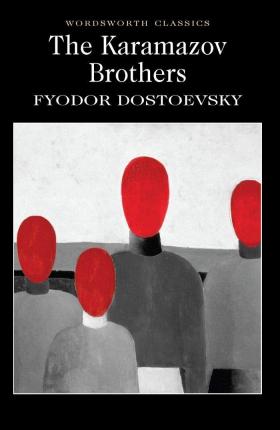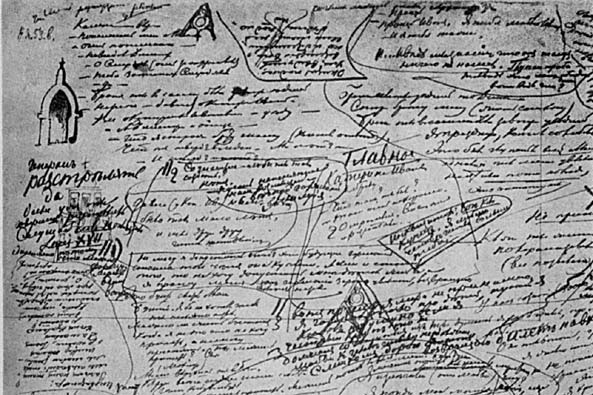
Author: Fyodor Dostoevsky
Description: Dostoevsky’s last and longest novel. The story revolves around three brothers, their different life philosophies, and a mysterious murder.
Book length: Very long
Rating: ⭐⭐⭐⭐
Dostoevsky’s Magnum Opus?
The Brothers Karamazov are often considered Dostoevsky’s greatest work. There are certainly a lot of aspects of this novel that speak in favor of this claim. Personally, I think Crime and Punishment is a better novel. However, if someone lists this as his favorite, I could totally see why. It is for sure one of the great works of Russian literature. But would I recommend The Brothers Karamazov to everyone? Not really, and here I will try to elaborate on why.
Translating Russian
First, I would like to give a brief overview of the different English translations. Choosing the right one for you might mean a lot when it comes down to how you’ll enjoy the book. When translating Russian, there are several approaches the translator can take. I will focus now on The Brothers Karamazov, but some of this generally applies to English translations of Russian works (a topic worth exploring on itself). There are 3 main paths you can choose:
1) Earliest translations. Translated by Constance Garnett. This is considered a good quality translation, although she tends to make the author sound Victorian. So this option should give you a readable, but period-sounding text.
2) Preserving the spirit of the original Russian work. In this approach the translator tries to preserve all the weirdness of Dostoevsky’s style. The translation is more literate, and readability is sometimes sacrificed. This includes Penguin’s translation, and also the infamous Pevear & Volokhonsky translation.
3) More in line with English. Here the text is translated in such a way that it is easier to read in English. It looses some of the specifics of Dostoevsky’s writing style, but is more readable for contemporary English readers. Oxford World’s Classics uses this kind of translation. You can see that already the title is changed from ‘The Brothers Karamazov’ to ‘The Karamazov Brothers’.
I should note that I’m not an expert in Russian literature, nor have I read all the translations, but those are some facts I came across while researching this topic. I read my copy in Croatian, with some occasional sneak peaks into Constance Garnett’s English translation.
What’s My Name?
One thing about names in Russian novels: there can be a lot of them for the same person. In their full form, we usually get three parts of a name: a first name, a patronymic (name based on the first name of one’s father), and a last name. So when we see a name like ‘Ivan Fyodorovich Karamazov’ we would know that Ivan is his first name, his father would be named Fyodor, and Karamazov would be the family name. Ivan’s father Fyodor would have another patronymic, in this case the full name would be Fyodor Pavlovich Karamazov. Female middle names use the suffix “avna” or “ovna”, which means “daughter of”.
Where some trouble begins regarding names is when the characters are referred to by nicknames. They are usually derived from characters first names. Depending on who addresses whom, there can be many nicknames for the same character, usually based on the level of familiarity between characters. More important characters tend to have a larger number of nicknames.
The Karamazovs
At the heart of the story is Fyodor Pavlovich Karamazov and his three sons: Dmitri, Ivan and Alexei. Fyodor had two marriages, but both of his wives died by the time the main events of the novel play out. He lives a hedonistic life and does not care too much for his sons, who are in turn mostly raised by his servants. After a somewhat brief backstory, we start to follow the main story, at which point the three brothers are already adults. Having taken different paths in life, with no real father or mother figure, the brothers are all very different.
Dmitri, often referred to as Mitya, is Fyodor’s first born and the only one from his first marriage. He is very similar to his father in character, although with a bit more moral in my opinion. Imagine a type that likes drinking, women, does not shrink from a bar fight, but ultimately has a good heart.
Ivan is the middle son, the first one from his second marriage. He is an intellectual, questioning the existence of God and all the unfair suffering in the world. For him, if there is no God, then there are no rules, and everything is allowed. He is not a fan of his father, nor of his brother Dmitri.
Alexei, also often Alyosha, is the youngest son. Alexei is the main protagonist (as described by the narrator in the novel). He is religious, has a good heart, and seeks to bond with both of his brothers. He is lovable, often also naive, which makes him popular with almost every other character.


Not an Easy Read Part I – The Length
The Brothers Karamazov is a long novel. It is twice the size of Dostoevsky’s other famous novel, Crime and Punishment. The two different copies I have are both 800+ pages, with a very small font size. Combine that with a writing style that can be weird (dependent on the translation), and you have a daunting task ahead of you.
While a very long book, it’s not the longest book I have read. I generally have no problem with long books, as long as they are good. If they are very long, they better be very good. For me, this one overstayed it’s welcome. It could easily be cut in half, and still get the main plot and messages across.
One thing to note here is that the way we are reading it now, as a complete novel, is not how the first audiences were receiving it. It was published in installments by journals, which contained other works and possible political agendas. This promoted discussions among people who read it, much like TV shows today (that do not give you the whole season at once). This ultimately led to a much different reading experience than what we get today.
Another reason for the book’s length is that Dostoevsky probably knew this was his last novel, so he patched multiple story lines he wrote before as separate projects into this one. And it shows.
Not an Easy Read Part II – The Content
As mentioned above, I don’t have a problem with long books, if the content is worth it and the book is well structured. The Brothers Karamazov, unfortunately, is not, at least in my opinion. There is some structure, some planning going on, but overall it feels like we are doing detours from the main story way too often. I specifically recall one point about half way through the book – we finally see the main plot move forward in a significant manner, the scene is interesting and ends in a way that piqued my interest. Right after that chapter we get about 50 pages of a side story which I did not care about at all. Those big subplots do have their own value, and contain some very interesting philosophy, however for me they felt often like a drag and I just wanted to get it over with to get back to the main story.
Some might say that this kind of messy, philosophical writing is what gives Dostoevsky’s novels their charm, and that is why you read them for. I get that perspective, but anyway feel that in philosophical writing you can do better and worse. Crime and Punishment is very similar in that regard, but in my opinion manages to balance the philosophy and actual story-telling much better, resulting in a deep, dense novel that is enjoyable to read even on a surface level. I think The Brothers Karamazov has that same potential, and by cutting off the major subplots we would get an excellent philosophical murder mystery.

Different Life Perspectives
So what is the novel about? Here I will not go into the plot, but just try to briefly outline the novel’s main ideas. We basically get three different attitudes towards life, represented by the three brothers.
Dmitri tries to enjoy the moment. He is often aware that his actions are not admirable, but he can’t help it and does them anyway. He accepts his shortcomings, often also openly criticizing himself. Dmitri represents the hedonistic way of living, similar to his father, but maybe not as extreme.
Ivan represents rationalism, and at the time, possibly the influence of the West on Russian religion and culture. He rejects the existence of God and fights with himself to find reason with the world.
Alyosha goes thorough life with a dose of naivety, trying to see the best in everybody. By naivety I don’t necessarily mean incompetence, but rather a child-like trust. He doesn’t overthink things, being a good person is all you need.
Dostoevsky tries to present how life looks like when accepting these different life philosophies, and we get this through following the characters thoughts, actions, and the consequences of those actions. The novel deals with questions like:
Does rational thinking make your life easier, in a psychological sense? Does rationalism lead to nihilism? Is ignorance bliss?
The main message might be that it’s better to be naive (maybe even stupid), but a good person, than smart and successful, but corrupt. Sometimes it’s better to preserve your childhood innocence. The world is full of things that once you see, hear or experience, it cannot be undone, for better or worse.
My Reading Experience & Thoughts
I was really excited to start reading The Brothers Karamazov. Crime and Punishment is one of my favorite novels, and I expected even greater things from this one based on all the hype surrounding it. It was a much more difficult read than I expected, and I had to break the reading up with other books in between.
Often times I found myself thinking how good the writing is. I got those strange instances where I can’t pinpoint why I liked a sentence, but it just sounded so natural and brilliant. The characters were believable and well fleshed out, my favorite being Dmitri.
I really liked the main plot and some parts dealing with philosophy. Overall though, the book got me exhausted more times that I liked, and at the end I was just glad I made it through.
Conclusion & Verdict
So how do the Brothers rank among the all-time great novels? It will take a very high seat on a lot of top lists, and for good reason. The parts that shine, shine really bright. Mainly the interesting characters and the different philosophies they represent. Many of us have parts of those different life views within ourselves, and here it feels as if those parts were taken out, each turned into characters, and put in the arena of life to explain why they are right.
Unfortunately, I think the book really suffers from the extensive subplots. Those pages add up quickly, and even though the subplots do provide some added value, it is ultimately to the detriment of the overall experience, at least in my opinion. I can imagine a version of this book which I would adore, had it been more focused on the main plot and characters – probably at half the size of what we actually got at the end. Regarding the writing style, I think it works really well in the context of the novel, however it may not be to everybody’s liking.
So should you read The Brothers Karamazov? If you’re a real fan of classic literature and Dostoevsky – yes. It is worth a read and you can get a lot from the book. If you are a casual reader who thought to maybe pick up a Russian classic, I would not really recommend it. In that case, pick up Crime and Punishment instead, if you have not already.
Rating: 4/5
Pros
+ Interesting characters
+ Intriguing main plot
+ Explores deep themes
+ Distinct writing style
Cons
– A bit of a messy structure
– Extensive subplot detours
– Too long
– Distinct writing style
Thank you for the insightful review. 😘
You are welcome!
Glad you liked it 😉